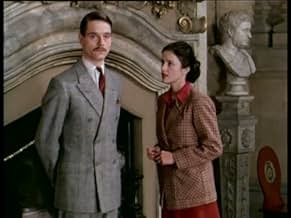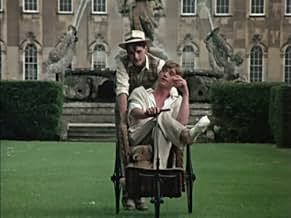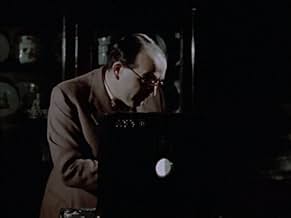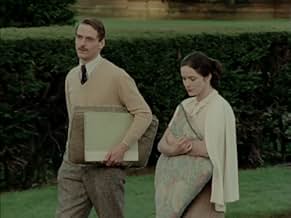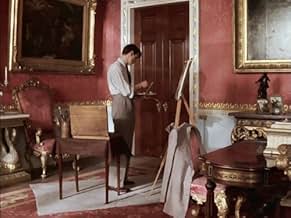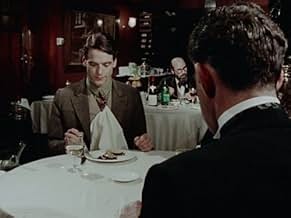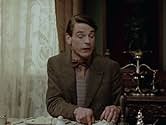La vida, amistades y romances del protagonista Charles Ryder, incluida su amistad con los Flyte, una familia de ricos católicos ingleses que viven en una mansión palaciega llamada Brideshead... Leer todoLa vida, amistades y romances del protagonista Charles Ryder, incluida su amistad con los Flyte, una familia de ricos católicos ingleses que viven en una mansión palaciega llamada Brideshead Castle.La vida, amistades y romances del protagonista Charles Ryder, incluida su amistad con los Flyte, una familia de ricos católicos ingleses que viven en una mansión palaciega llamada Brideshead Castle.
- Ganó 1 premio Primetime Emmy
- 13 premios ganados y 19 nominaciones en total
Explorar episodios
Opiniones destacadas
The reviewers who have given positive feedback for this series have done quite well and I have little to add. Sadly, there was one review that seemed to miss the point, and I would like to address this:
"We can suppose that Lord Marchmain pretended to convert to comfort his family. There is no such excuse for Charles, who has seen the damage that Catholicism did to the whole family."
Wrong. It was the shirking of religious principle that tore apart the family. Lord Marchmain left Catholicism and thought he had license to leave his wife, so he abandoned his children to a confused, fatherless upbringing. Had he remained true to his sacramental vow to stay, "for better or for worse," by his wife's side, the family would never have been so dysfunctional.
As for the vague homo-eroticism in the first few episodes, many young men at Oxford back in the day did go through such phases and often they were in fact merely PHASES. Evelyn Waugh himself apparently did.
"We can suppose that Lord Marchmain pretended to convert to comfort his family. There is no such excuse for Charles, who has seen the damage that Catholicism did to the whole family."
Wrong. It was the shirking of religious principle that tore apart the family. Lord Marchmain left Catholicism and thought he had license to leave his wife, so he abandoned his children to a confused, fatherless upbringing. Had he remained true to his sacramental vow to stay, "for better or for worse," by his wife's side, the family would never have been so dysfunctional.
As for the vague homo-eroticism in the first few episodes, many young men at Oxford back in the day did go through such phases and often they were in fact merely PHASES. Evelyn Waugh himself apparently did.
10curt-28
It is exceptional to find something in life that improves with age. Brideshead Revisited is one of those exalted things. Having just completed watching the entire series I can say that it is actually better than I remembered when I first saw it over 15 years ago. Seldom do so many things (cast, writing, locations, costumes) come together and form a harmonious whole. Brideshead is a tour-de-force of the film maker's art that glows with a magical intensity all its own.
Simply enchanting. Waugh's excellent use of English in recounting the story of the doomed Marchmain family is brought to life without losing one iota of its charm and power. I doubt that anyone will be able to imagine anyone other than Anthony Andrews as Sebastian or Nikolas Grace as Anthony Blanche; Jeremy Irons gives a well-rounded performance, Diana Quick is suitably gorgeous and a host of great English actors (Gielgud, Olivier et al) lend support to a fantastic script and excellent direction. See this.
Evelyn Waugh's 'Brideshead Revisited' is, I think, the quintessential and the finest novel of the twentieth century - English literature at its highest form. And this 1981 miniseries does the novel great justice: its episodes give us television's finest hours.
The splendid cast makes the most of the rich script, which is as faithful to a novel as a script can be. My favorite is Phoebe Nicholls as Lady Cordelia: her performance is disarming, utterly charming. And Nickolas Grace plays to the hilt the sybaritic, viper-tongued Anthony Blanche.
Jeremy Irons does sterling service as the narrator, Charles Ryder, who is, after all, Waugh's observant eye and eloquent tongue; Irons depicts poignantly Ryder's "conversion to the Baroque" crashing to bits against the cold gracelessness of "The Age of Hooper". As the rapidly dissolving Lord Sebastian Flyte Anthony Andrews is memorable - should Waugh's book ever again be adapted for the screen the lot of the actor cast as Sebastian will not be enviable.
Claire Bloom's Lady Marchmain is a study in quiet dignity upheld vainly in the face of the twentieth century's ravaging of her character's world and sensibilities. Sir Laurence Olivier's Lord Marchmain is letter-perfect; and in the deathbed sequences Olivier's performance is tenderly, expertly nuanced.
Diana Quick was a bit too old to play convincingly the debutante Lady Julia of the early episodes, but in the later ones Quick hits perfectly every disillusioned, jaded, repentant note. Charles Keating as Rex, who inhabits a "harsh acquisitive world", is an exemplar of shallowness, of the venality Waugh detested - and satirized so hilariously in his earlier novels: he's nothing more than a Hooper with money and ambition.
Simon Jones gives us Bridey's stodginess and bewliderment with marvelous understatement. John Gielgud steals every scene as Charles's father Edward, brilliantly interpreting of one of Waugh's most delicious, yet indigestible characters.
There are rich offerings, too, from character actors: Stephane Audran glows warmly as Clara, Lord Marchmain's insightful, intuitive, down-to-earth mistress; John LeMesurier leaves us suitably agape as the Jesuit Father Mowbray baffled and dismayed by Rex's utilitarian approach to his conversion to Catholicism; Jeremy Sinden sails naively along as the indefatigable yet ever-dimwitted and clueless Boy Mulcaster; Ronald Fraser stirs just the right sloshing of queasiness as the peculiar, opportunistic shipboard cocktail party guest; Jonathan Coy, as the parlous, seedy Kurt, is perfectly repellent; Jane Asher tiptoes delicately through Celia Ryder's conventional, porcelain sensibilities; and Mona Washbourne knits a thoughtful, lovely portrait of Nanny Hawkins.
Throughout 'Brideshead Revisited' the photography is lush, meticulous, yet tasteful. The score is understated, never intrusive, always complementary. Costuming, set design and, above all, location, are unrivalled. Charles Sturridge's direction is evenhanded, assured - and his pacing of the narrative treads adroitly every beautifully-modulated beat.
I bought the DVD version of this series and, though occasional bits of the image transfer are a trifle fuzzy and the sound re-recording is sometimes uneven, the nicely boxed set of discs pleased - and goes on pleasing - me greatly.
In the early third millennium, a time of evermore immature programming and production executives - a dismal age of TV's Hoopers, I have to suspect sadly that television will never again attain the heights to which 'Brideshead Revisited' vaulted. But I shall remain ever grateful for this magnificent series.
The splendid cast makes the most of the rich script, which is as faithful to a novel as a script can be. My favorite is Phoebe Nicholls as Lady Cordelia: her performance is disarming, utterly charming. And Nickolas Grace plays to the hilt the sybaritic, viper-tongued Anthony Blanche.
Jeremy Irons does sterling service as the narrator, Charles Ryder, who is, after all, Waugh's observant eye and eloquent tongue; Irons depicts poignantly Ryder's "conversion to the Baroque" crashing to bits against the cold gracelessness of "The Age of Hooper". As the rapidly dissolving Lord Sebastian Flyte Anthony Andrews is memorable - should Waugh's book ever again be adapted for the screen the lot of the actor cast as Sebastian will not be enviable.
Claire Bloom's Lady Marchmain is a study in quiet dignity upheld vainly in the face of the twentieth century's ravaging of her character's world and sensibilities. Sir Laurence Olivier's Lord Marchmain is letter-perfect; and in the deathbed sequences Olivier's performance is tenderly, expertly nuanced.
Diana Quick was a bit too old to play convincingly the debutante Lady Julia of the early episodes, but in the later ones Quick hits perfectly every disillusioned, jaded, repentant note. Charles Keating as Rex, who inhabits a "harsh acquisitive world", is an exemplar of shallowness, of the venality Waugh detested - and satirized so hilariously in his earlier novels: he's nothing more than a Hooper with money and ambition.
Simon Jones gives us Bridey's stodginess and bewliderment with marvelous understatement. John Gielgud steals every scene as Charles's father Edward, brilliantly interpreting of one of Waugh's most delicious, yet indigestible characters.
There are rich offerings, too, from character actors: Stephane Audran glows warmly as Clara, Lord Marchmain's insightful, intuitive, down-to-earth mistress; John LeMesurier leaves us suitably agape as the Jesuit Father Mowbray baffled and dismayed by Rex's utilitarian approach to his conversion to Catholicism; Jeremy Sinden sails naively along as the indefatigable yet ever-dimwitted and clueless Boy Mulcaster; Ronald Fraser stirs just the right sloshing of queasiness as the peculiar, opportunistic shipboard cocktail party guest; Jonathan Coy, as the parlous, seedy Kurt, is perfectly repellent; Jane Asher tiptoes delicately through Celia Ryder's conventional, porcelain sensibilities; and Mona Washbourne knits a thoughtful, lovely portrait of Nanny Hawkins.
Throughout 'Brideshead Revisited' the photography is lush, meticulous, yet tasteful. The score is understated, never intrusive, always complementary. Costuming, set design and, above all, location, are unrivalled. Charles Sturridge's direction is evenhanded, assured - and his pacing of the narrative treads adroitly every beautifully-modulated beat.
I bought the DVD version of this series and, though occasional bits of the image transfer are a trifle fuzzy and the sound re-recording is sometimes uneven, the nicely boxed set of discs pleased - and goes on pleasing - me greatly.
In the early third millennium, a time of evermore immature programming and production executives - a dismal age of TV's Hoopers, I have to suspect sadly that television will never again attain the heights to which 'Brideshead Revisited' vaulted. But I shall remain ever grateful for this magnificent series.
Old Bridie stuck with me for years between first seeing it and then reviewing on a tv re-run not long ago. The story of Charles and Sebastian and their families (and Sebastian's teddy bear) opens out Evelyn Waugh's slow-paced novel and instead of rushing through it in a couple of hours takes time to work with it and present the story at a leisurely pace, taking stock of some of the UK's greatest scenery.
Jeremy Irons and Anthony Andrews play the leads, who meet at University and become lifelong friends. Diana Quick and Phoebe Nicholls play Sebastian's sisters, and the two boys' fathers are played by no less than Olivier and Gielgud. Inspired casting. Mona Washbourne is also used well, along with Nickolas Grace.
I think the days of these long and involved dramas have long gone by in the climate of 'whatever grabs ratings quickest'. But Granada TV managed to make a British gem which will and should be remembered for many years. Excellent.
Jeremy Irons and Anthony Andrews play the leads, who meet at University and become lifelong friends. Diana Quick and Phoebe Nicholls play Sebastian's sisters, and the two boys' fathers are played by no less than Olivier and Gielgud. Inspired casting. Mona Washbourne is also used well, along with Nickolas Grace.
I think the days of these long and involved dramas have long gone by in the climate of 'whatever grabs ratings quickest'. But Granada TV managed to make a British gem which will and should be remembered for many years. Excellent.
¿Sabías que…?
- TriviaOriginally, producer Derek Granger asked Anthony Andrews to play the role of Charles Ryder. Andrews, however, felt he was better suited for the part of Sebastian Flyte. Jeremy Irons, Granger's first choice for Sebastian, preferred to play Ryder, so the two actors swapped roles.
- Versiones alternativasThe voiceover in the early Venice sequences was added for the American version after producer Derek Granger saw the initial British broadcast and felt there was not a strong enough sense of the religious feelings evoked while viewing the paintings.
- ConexionesFeatured in The 34th Annual Primetime Emmy Awards (1982)
Selecciones populares
Inicia sesión para calificar y agrega a la lista de videos para obtener recomendaciones personalizadas
- How many seasons does Brideshead Revisited have?Con tecnología de Alexa
Detalles
- Fecha de lanzamiento
- País de origen
- Idioma
- También se conoce como
- Wiedersehen mit Brideshead
- Locaciones de filmación
- Castle Howard, Henderskelfe, York, North Yorkshire, Inglaterra, Reino Unido(Brideshead Castle: exterior and some interiors)
- Productora
- Ver más créditos de la compañía en IMDbPro
Contribuir a esta página
Sugiere una edición o agrega el contenido que falta




